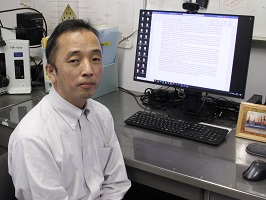Kanya Hamasaki
Affiliation
Department of Molecular Biosciences
E-mail: hamasaki@rerf.or.jp
E-mail: hamasaki@rerf.or.jp
About
Dr. Hamasaki joined the Department of Genetics (currently Molecular Biosciences) in 2009. Since then, as a research scientist of Cytogenetics laboratory, He has been involved mainly in the study of the biological assessment of A-bomb radiation dose using peripheral blood lymphocytes from A-bomb survivors. He is also interested in the effects of radiation on the fetus and is currently studying on evaluating the radiation effects on mouse hematopoietic cells after in utero exposure by measuring chromosome aberrations.
Education
- 2009
- Ph.D, Medical Science, Hiroshima University, Hiroshima, Japan
- 1997
- M.S. Pharmacy, Tokushima University, Tokushima, Japan
- 1995
- B.S Pharmacy, Tokushima University, Tokushima, Japan
Experience
- Radiation Effect Research Foundation
-
- 2016-
Research Scientist, Cytogenetics Laboratory, Department of Molecular Biosciences
- 2009-2016
Research Scientist, Cytogenetics Laboratory, Department of Genetics
- 2016-
Selected publications
- Hamasaki K and Nakamura N. Effect of radiation exposures on fetal hematopoietic cells. Current Stem Cell Reports. 2019; 5(2): 92-99.
- Hamasaki K, Landes RD, Noda A, Nakamura N, Kodama Y. Irradiation at different fetal stages results in different translocation frequencies in adult mouse thyroid cells. Radiat Res. 2016; 186(4): 360-366.
- Nakano M, Nishimura M, Hamasaki K, Mishima S, Yoshida M, Nakata A, Shimada Y, Noda A, Nakamura N, Kodama Y. Fetal irradiation of rats induces persistent translocations in mammary epithelial cells similar to the level after adult irradiation, but not in hematolymphoid cells. Radiat Res. 2014; 181(2): 172-176.
- Hamasaki K, Kusunoki Y. Nakashima E. Takahashi N Nakachi K. Nakamura N. Kodama Y. Clonally expanded T lymphocytes from atomic bomb survivors in vitro show no evidence of cytogenetic instability. Radiat Res. 2009; 172(2): 234-243.


